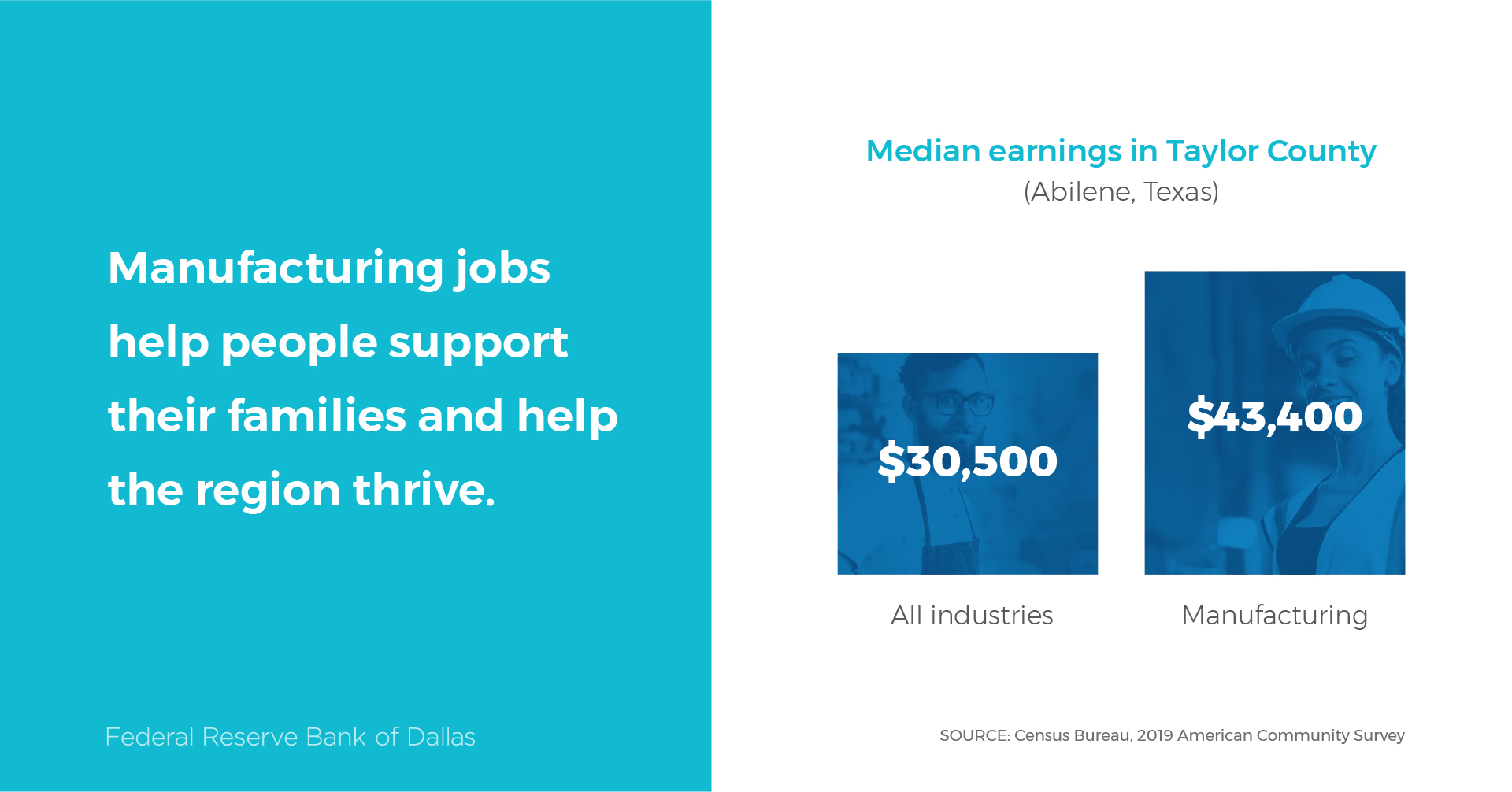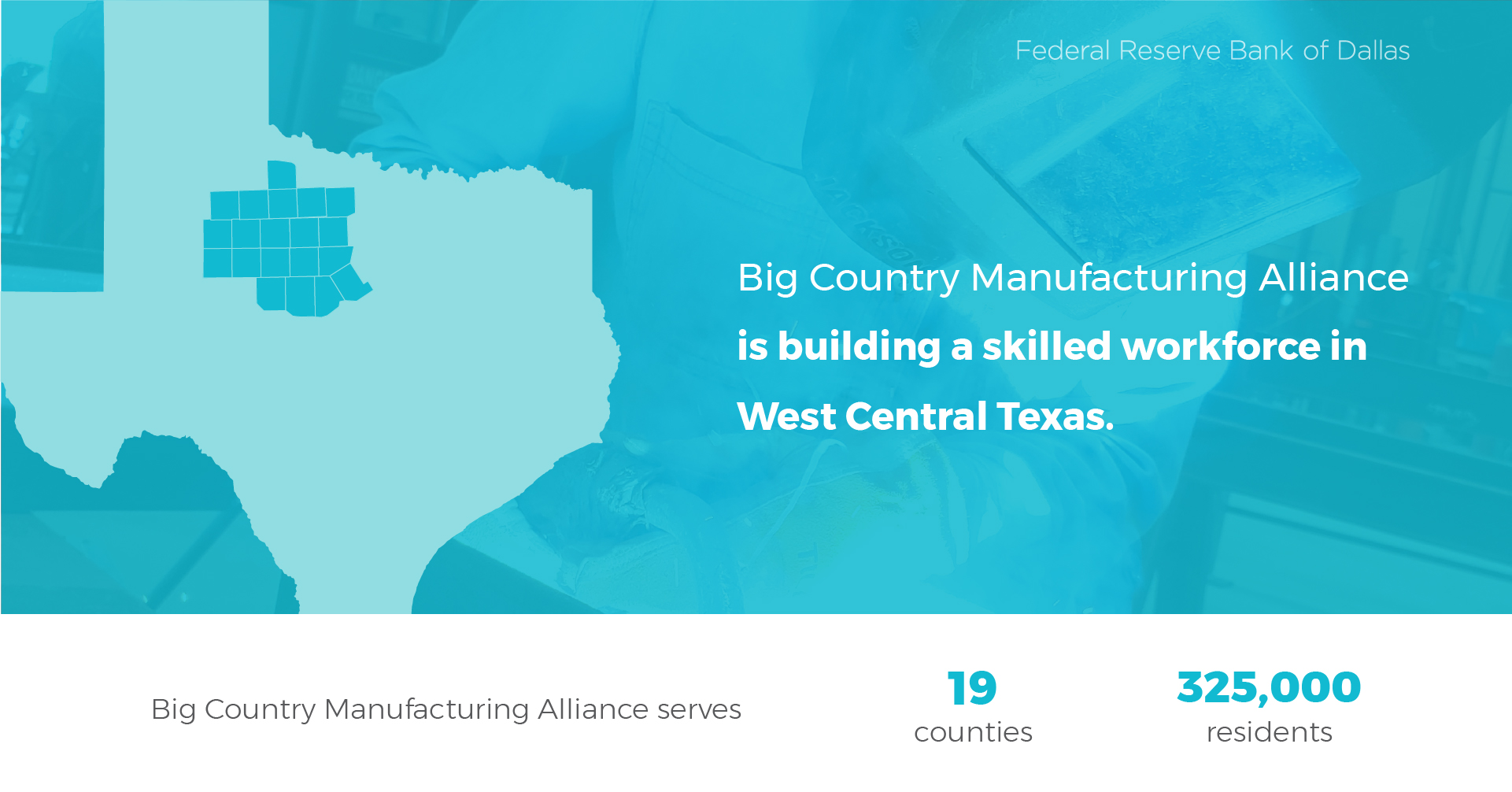
Putting manufacturing jobs on the map: Dallas Fed, Big Country Alliance partner to grow West Texas workforce
Bathshua Barron graduated from high school in West Central Texas and found her first job cleaning houses. She was eager to build a career but wasn’t sold on spending four years getting a college degree. When her mom heard about welding classes at Cisco College, the local community college in Cisco, Texas, Barron enrolled in an 18-month welding certification program.
“My grandfather was also a welder,” Barron said. “My dad was a roofer. If you can learn a trade, usually you're able to get a decent job and you know you will always have something you can fall back on.”
Five years after receiving her certification, Barron has worked for several manufacturing companies, gaining valuable experience and increasing her pay. She’s now a certified welding inspector at BWJ Metalworks, a company in Abilene, Texas, that fabricates metal products shipped around the world.
“I knew that you could make great money in welding, and that was one reason why I got into it, but at the same time, it just really intrigued me,” Barron said. “When I got under the hood, I felt like I was in my own little world.”
Creating success stories like Barron’s is the goal of the Big Country Manufacturing Alliance (BCMA), a partnership of manufacturing companies in West Central Texas that is working to connect community members with rewarding careers. As a participant in the Dallas Fed’s Advance Together initiative, BCMA is poised to expand its impact even more.
Raising awareness of manufacturing careers in the Texas Big Country
BCMA serves a 19-county region, including Abilene and surrounding communities, with a population of more than 325,000. It aims to increase the number of manufacturing jobs and build the local workforce to support economic growth in the region.
Manufacturing jobs present the potential for many workers to make a living wage. In Taylor County, home of Abilene, median earnings for the manufacturing sector were about $43,400, compared with the county’s median for all industries of $30,500, according to the Census Bureau’s 2019 American Community Survey.

Some manufacturing jobs, like Barron’s, also are considered opportunity occupations—jobs available to workers without a bachelor’s degree that pay more than the national median wage (approximately $39,800 in 2019).
BCMA partners with educators across West Central Texas to increase students’ awareness of manufacturing careers. The alliance targets outreach at K–12 schools and community colleges, like Cisco College, where Barron received her welding certification. BCMA wants to dispel common misconceptions that students have about manufacturing—that it’s dirty or dangerous—and open them up to the idea of manufacturing as a rewarding career pathway.
“I don’t think these kids are often told that there’s a place for them and they can have a great career,” said Amy Hall, the strategic initiatives manager for Workforce Solutions of West Central Texas and lead coordinator for BCMA. “When our employers go in and do guest speaking engagements, they’re telling these kids, there is a place for you. This is a successful path that you can take.”
One of those speakers is Rebecca Lowery, a 30-year industry veteran. She works at RAM Inc., a Cisco-based manufacturing firm that produces molded parts for commercial and U.S. military aircraft and is a member of BCMA. Lowery presents to students as part of BCMA’s programming and emphasizes how manufacturing provides opportunities for both personal and professional growth.
“I think there are a lot of opportunities in manufacturing that might be looked over,” Lowery said. “Especially if you go into smaller companies…you get to learn all different components of the business of manufacturing. For a person that is starting out, it is a great way to learn different aspects of manufacturing. You can guide yourself through a career that way.”
Advancing BCMA’s work in the community
BCMA’s promising approach to building a skilled workforce in West Central Texas led to its selection for Advance Together (see note below). Along with three other regional partnerships in Texas, BCMA is receiving $300,000 from philanthropic sources to support its plans to address education and workforce challenges in the community, as well as training and coaching from the Dallas Fed to increase the impact of its programs.
Over the next three years, BCMA aims to increase work-based learning opportunities for students, including additional internships and apprenticeships at manufacturing companies. It also will focus on upskilling the existing manufacturing workforce across the Big Country, defining clear career paths for entry-level workers to move into middle-skill manufacturing jobs.

In addition, while employers in the alliance have already been engaging with regional economic development and education officials, BCMA has learned through Advance Together that it needs to put more emphasis on involving community organizations and residents.
“A lot of communities that are working on issues don’t have the employers at the table, so we were kind of opposite,” Hall said. “We realized we had to bring in other people to be part of our team.”
To strengthen the pipeline for manufacturing talent in the region, BCMA knows it must reach broader audiences. The partnership has created a new steering committee of diverse community stakeholders to add more perspectives to its work and help spread awareness of manufacturing careers. The alliance is now working with a variety of community leaders to connect with immigrants, faith-based groups and military veterans.
“We’re just trying to look across our community and say, ‘Who is here, who can benefit from these jobs?’” Hall said.
BCMA’s efforts to broaden its community connections will help promote equitable access to manufacturing jobs in West Central Texas. The partnership has set a goal of 450 new high-wage manufacturing jobs in the region by 2030 and views racial and gender equity as important considerations.
Diversifying the workforce is a concern throughout the manufacturing sector. Across the U.S., only about 17 percent of workers in manufacturing in 2020 were Hispanic or Latino, and only 30 percent were women. In BCMA’s 19-county region, where one of every four residents is Hispanic, alliance partners believe they can make progress on closing these gaps.
By working together with the community to increase equitable access to manufacturing jobs, BCMA hopes to build a brighter economic future for all people in the Big Country. Lowery, from RAM, says that manufacturers have a big economic impact, especially in rural communities.
“It supports your whole community,” Lowery said. “The families that work in that manufacturing company all live there. You’re supporting their families. Every person that’s in that plant has a family.”
The Dallas Fed leads Advance Together in partnership with Educate Texas, United Ways of Texas and a steering committee of business, education and community leaders. It coordinates the program but does not fundraise, provide grants or participate in the selection of grantees. Funding partners include the Doris Duke Charitable Foundation, the Kresge Foundation, Texas Mutual, Communities Foundation of Texas and the Meadows Foundation.
Author
The views expressed are those of the author and should not be attributed to the Federal Reserve Bank of Dallas or the Federal Reserve System.
